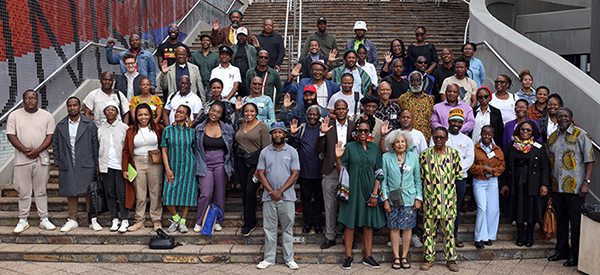College of Human Sciences
Re-igniting and re-imagining Pan Africanism, Afrocentricity and Afrofuturism in the 21st century
Renowned scholars and delegates gathered to commemorate the centenary of Robert Sobukwe's birth and discuss Pan Africanism and strategies for uniting Africa in the 21st century. With distinguished keynote speakers and thought-provoking presentations, the Robert Mangaliso Sobukwe Centenary International Conference aimed to inspire new visions for the continent's future. The conference was hosted in Unisa's Senate Hall from 2 to 4 April 2024.

Conference attendees
With a focus on Afrocentric perspectives and futuristic visions, attendees engaged in presentations, discussions and cultural activities aimed at reinvigorating the ideals of unity and progress. As a conducive environment for scholarly exchange and reflection, the conference honoured Sobukwe by recognising his contribution to the liberation struggle and emphasising the relevance of his ideas in contemporary discourse.
The opening address of Prof Zethu Nkosi, Executive Dean of Unisa's College of Human Sciences, set the stage for three days of deliberations. Distinguished keynote speakers examined various aspects of Pan Africanism, Afrocentricity and Afrofuturism. On day 1, Emeritus Professor Kwesi Kwaa Prah captivated the audience with a presentation titled "The legacy of Mangaliso Sobukwe and the Challenge of Uniting Africa" by shedding light on the enduring relevance of Sobukwe's ideas in the contemporary African context.
Day 2 featured Emeritus Professor Nah Dove, whose presentation titled "African Womanism and Afrofuturism: A cultural leap back into the future" explored the role of women in shaping future narratives and advancing Afrocentric perspectives. That evening, a gala dinner provided the opportunity for networking and cultural exchange. On the final day, Emeritus Professor Mogobe Ramose delivered a compelling presentation titled "From Pan Africanism to Pan Africanness: an ubuntu plea for the oneness of Africa", emphasising the importance of shared values and identities to foster continental unity.
Attendees visited the Unisa Gallery for the "We, the Purple" Exhibition, where Pan Africanism and Afrofuturism found artistic expression. The exhibition drew inspiration from the protests of the 1980s when water cannons sprayed purple water to identify and arrest protesters. During such a protest, a protester seized control of a water cannon and indiscriminately sprayed protesters and bystanders so that the police was unable to arrest targeted protesters.
Modern and expressionistic artworks represented the challenges of contemporary African societies. Not only the ongoing struggle but also the resilience of individuals confronting everyday challenges were portrayed in different media and resonated with themes such as resistance, identity and social justice in Africa.
In conclusion, the Robert Mangaliso Sobukwe Centenary International Conference served as a platform for scholars, activists and enthusiasts to honour the legacy of Sobukwe, explore critical issues in Pan Africanism, and envision a united and prosperous future for Africa.
* By: IHlubi Veli Mabona, Marketing Assistant, College of Human Sciences
Publish date: 2024/04/25

 Unisa co-hosts G20 community outreach in the Eastern Cape
Unisa co-hosts G20 community outreach in the Eastern Cape
 Unisans gain membership of prestigious science academies
Unisans gain membership of prestigious science academies
 Advocating for disability transformation through servant leadership
Advocating for disability transformation through servant leadership
 Unisa Press continues to illuminate the publishing space
Unisa Press continues to illuminate the publishing space